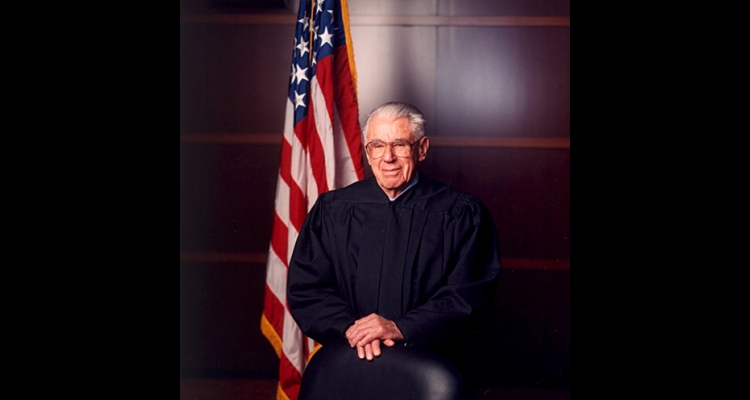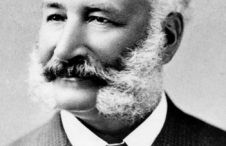Reno Jewry
Reno's early Jewish community played an important role in the development of Northern Nevada's largest city, creating an economic, religious, and intellectual legacy that continues into the twenty-first century. In 1868, Jewish merchants were among those who purchased lots when the Central Pacific Railroad auctioned off land along its right-of-way for the creation of Reno. Although they rarely numbered more than one percent of the population, Jews dominated Reno's dry goods and clothing market during the nineteenth and early twentieth centuries. They were among the first in the hotel and casino businesses after 1931, and by the twenty-first century, they supported three congregations and a small cultural infrastructure.
One of Reno's first Jewish residents was Jacob W. Davis, a tailor by profession who partnered with Frederick Hertlein to build the Reno Brewery in 1868. A few years later he fabricated denim work pants with copper rivets at the seams, sharing patent rights with Levi Strauss. Another early settler was David Lachman, who was instrumental in establishing a Jewish cemetery in 1877. Lachman co-founded the Reno Hebrew Benevolent Society in 1879 to assist newcomers, and in the absence of a rabbi, he was often called upon to lead High Holiday services. Reno absorbed the remnants of a declining Jewry in Virginia City and Carson City, and in 1895 they formed their own B'nai B'rith fraternal lodge. By 1900, Reno Jews numbered approximately 140. In 1908, sixty-five men organized the Young Men's Hebrew Association, the Jewish counterpart of the YMCA.
Reno's Jewish population was small but politically active. Reno clothier Phil Jacobs joined three other Northern Nevada Jews in the 1901 state legislature. One of these was native-born Samuel Platt, who became Speaker of the assembly, and a state Republican Party leader. Platt and many of Reno's most prominent citizens were secular Jews, unaffiliated with any Jewish organization. One of them was Dr. Henry Bergstein, former state assemblyman from Pioche, who authored Nevada's first legislation on medical standards. He was superintendent of the Nevada State Hospital from 1895 to 1898, and served for several years thereafter as Reno City Health Officer while on the staff of St. Mary's Hospital. Another was Moritz Scheeline, who organized the Bank of Nevada in 1890. In 1907, he disassociated himself from other banking affiliations and formed the Scheeline Banking and Trust Company, which was one of the few to survive the banking crisis of that year.
Sam Frank was also an ethnic Jew without religious ties. He came to Reno in 1901, and was in the wholesale liquor business for seventeen years until the Eighteenth Amendment to the U.S. Constitution outlawed the manufacture and sale of alcoholic beverages. During the Prohibition era (1920 to 1933), Frank and his more religiously active brother, Benjamin, ran a soft drink plant. Together they owned and operated the Grand Central Garage, which was considered Reno's largest and most modern such facility. Sam sat on the Reno City Council for nearly twenty-five years beginning in 1913. During that time he also assumed the duties of mayor when that post became vacant. In 1935, he was a director of the Washoe County Library and manager of Reno's fledgling municipal airport.
B'nai B'rith lodge officers became the nucleus of the Emanu-El congregation in 1914. The 175 Reno Jews in 1921 built Nevada's first permanent synagogue at 416 West Street (present site of the Silver Legacy parking garage). The first resident rabbi, Hirsh Opoczynski—later changed to Harry Tarlow—was Orthodox, trained in Israel and served Emanu-El from 1932 for almost twenty years. He and his wife, Pearl, opened two kosher boarding houses for Jews applying for a divorce. In 1947, the congregation officially affiliated with Conservative Judaism, and Tarlow received emeritus status.
Temple Emanu-El had grown to include more American-born Jews with religious ideas different from the Orthodox founder or sitting rabbi. Self-styled "younger" members of the synagogue broke from Temple Emanu-El to form their own short-lived Temple Beth Or in 1941. Among the dissidents were Norman Samuelson, Deputy Attorney under Governor Grant Sawyer, and Bert Goldwater, future chairman of Nevada's Equal Rights Commission. The group temporarily realigned with Temple Emanu-El, but in 1962 a dozen families led by Louis and Ruth Dickens left to organize Reform Temple Sinai. Their northwest Reno synagogue rose in 1970. In 1984 they hired Myra Soifer, Nevada's first female and, to date, longest tenured pulpit rabbi.
After gambling's legalization in 1931, Reno hotel and casino managers included former Tonopah entrepreneur Nick Abelman, the Bulasky brothers, Doc Stacher, and Jack Sullivan (nee Scarlett), who had the slimmest relationship with organized religion. In 1996, David Farahi and his sons turned a tiny Virginia Street motel into the Atlantis Casino Resort Spa. The Farahi families were financial supporters of both the re-located Temple Emanu-El in southwest Reno and the neo-Orthodox Lubavitcher Chabad, which opened a day school and worship center in 2007. Earlier, the Chabad built Reno's first Jewish ritual bath (mikveh).
The Greater Reno/Sparks Jewish population was estimated in 2005 to be about 14,000, of whom only a small fraction were active members of the area's three congregations. Some of the unaffiliated were members of fellowship groups, called havurot, which met informally for discussion or celebration. The large number of secular Jews were also among contributors to annual fund raisers for international Jewish causes sponsored by AIPAC and United Jewish Communities. Their increased numbers encouraged the area's first Jewish film festival led by popular critic, professor, and University of Nevada Regent Howard Rosenberg in 2007.
Reno Jews from the earliest days celebrated the feast of Purim in early spring. It has been an event variously marked by costume balls and late night dinners. The tradition continued into modern times, with events often held in hotel casinos to accommodate large numbers. In recent years, both secular and religious Jews gathered to celebrate Israel Independence Day.
All of Reno's Jewish congregations offered a variety of social, religious, and ethnic learning opportunities for children and adults. Reno's Jews represented about three percent of the total population in 2007, but they maintained a modest religious and cultural support system. Despite the smallness of their numbers and the virtual absence of anti-Semitism, in recent years Temple Emanu-El was twice the object of attempted arson, while vandals once victimized the local Jewish cemetery.




